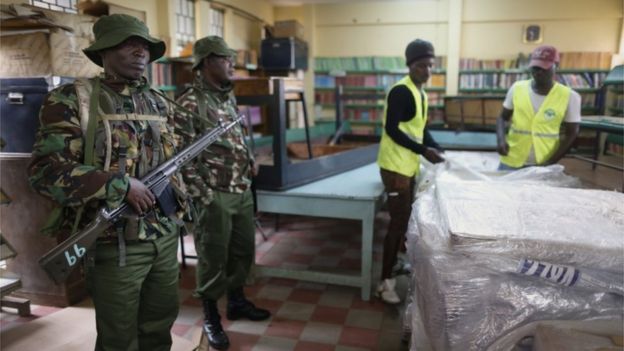Kenya election 2017: President Kenyatta urges peaceful vote
He urged the 19 million registered voters to turn out in great numbers, but to "do so in peace".
The contest pits Mr Kenyatta against his long-time rival, Raila Odinga, and is seen as too close to call.
The final week of campaigning has been marred by the murder of a top election official and claims of vote-rigging.
Mr Kenyatta, the 55-year-old son of Kenya's founding president, is seeking a second and final term in office.
Observers say the leading candidates have both avoided inflammatory speeches as polling day draws closer. In 2007 more than 1,100 Kenyans died and 600,000 were displaced after a disputed election - an outcome neither side wants to see repeated.
"After you cast your ballot, please go home," Mr Kenyatta said on Monday.
"Go back to your neighbour. Regardless of where he or she comes from, their tribe, their colour or their religion. Shake their hand, share a meal and tell them 'let us wait for the results,' for Kenya will be here long after this general election."
Opposition leader Mr Odinga, of the National Super Alliance, also addressed the public. He raised fears about vote-rigging and claimed the deployment of at least 150,000 members of the security forces was a ploy to intimidate voters.
However, he congratulated Mr Kenyatta on his campaign, describing him as a "worthy opponent".
"May the stronger candidate win tomorrow," he said.
Eight presidential candidates will be on the ballot on Tuesday, with polls open from 06:00-17:00 local time (03:00-14:00 GMT).
To win outright, a candidate needs 50% plus one vote, and at least 25% of the votes in 24 of Kenya's 47 counties.
If that threshold is not met it will trigger a run-off vote between the top two candidates, with the winner requiring a simple majority.
First results are not expected before Wednesday, but if the race is close it could take three days for a winner to emerge.
Voters will also choose lawmakers, senators, governors, county officials and women's representatives. More than 14,000 candidates are taking part in those elections.
Fourth time lucky?
Mr Odinga, 72, has run for president three times and lost each time. President Kenyatta beat him in the last election in 2013, but their rivalry is generations old - their fathers were political opponents in the 1960s.


Mr Kenyatta and his running-mate William Ruto were indicted by the International Criminal Court for their alleged roles in the bloodshed a decade ago. The case ultimately collapsed due to lack of evidence, and after key witnesses died or disappeared.
Hate speech flyers and rhetorical text messages have been circulating, making Kenyans nervous. Some are stockpiling food and water while police have prepared emergency first aid kits.
Some families have travelled from the capital, Nairobi, to their ethnic heartlands over fears of violence.
Writing from Nairobi, the BBC's Alastair Leithead says what happens after the election is less about who wins and more about how those who lose take their defeat.
The success of the country's computerised voting system is key to the process being considered free and fair.
If it fails - as it did in 2013 - the votes will be counted manually and the loser will no doubt challenge the result.
[BBC SOURCES]


No comments